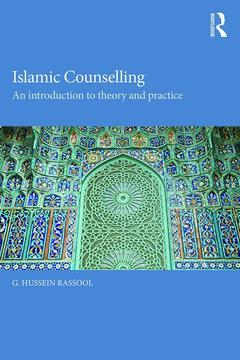Description
Islamic Counselling
An Introduction to theory and practice
Author: Rassool G. Hussein
Language: English
Subject for Islamic Counselling:
Keywords
Muslim Clients; Islamic Counselling; Islamic; Follow; counselling; Hold; psychotherapy; Chronic; muslim; Islamic Perspective; islamic studies; Sheikh Muhammad Ibn; islamic ethics; Muslim World; spirituality; Religious Coping; religion; Unconditional Positive Regard; Psychodynamic; Multicultural Counselling; Vice Versa; Spiritual Interventions; CAMH; Abu Dawud; Mainstream Counselling; PCA; Agnostics; Counselling Process; Therapeutic Approaches; Pre-marital Counselling; Ve Daily Prayers; CSAT; Psychoactive; Fard Kifaya
Publication date: 07-2015
· 15.6x23.4 cm · Paperback
Publication date: 07-2015
· 15.6x23.4 cm · Hardback
Description
/li>Contents
/li>Readership
/li>Biography
/li>
Islamic counselling is a form of counselling which incorporates spirituality into the therapeutic process. Until now there has been little material available on the subject with no one agreed definition of Islamic counselling and what it involves. There has also been a rapidly growing population of Muslims in Western societies with a corresponding rise in need of psychological and counselling services. Islamic Counselling: An Introduction to theory and practice presents a basic understanding of Islamic counselling for counsellors and Islamic counsellors, and provides an understanding of counselling approaches congruent with Islamic beliefs and practices from a faith-based perspective.
The book is designed as an introduction for counsellors, its goal is to inform the reader about how the diverse roles of the Islamic counsellor fit together in a comprehensive way and to provide the guidelines that can be potentially integrated into a theoretical framework for use. The book is divided into two parts. Section one: Context and Background, and Section two: Assessment, Models and Intervention Strategies.
Islamic Counselling encompasses both current theory, research and an awareness of the practice implications in delivering appropriate and effective counselling interventions with Muslim clients. It will be essential reading for both professionals and students alike.
Preface. Acknowledgements. Part I: Context and Background. Islam and Muslims. Counselling and Islamic Counselling. Spirituality and Islamic Counselling. Understanding Human Nature and Personality Development in the Islamic Context. Psychological Health: Cultural & Religious Influences. Understanding the Muslim Client. Islamic Ethics Related to Counselling. Part II: Assessment, Models and Intervention Strategies. General Guidelines for the Assessment of Muslim Clients. Psychodynamic Counselling and Therapy. Humanistic Approach: Client-Centred Counselling. Cognitive-Behaviour Therapy: An Islamic Perspective. Solution-Focused Brief Therapy. Pre-Marital and Marital Counselling. Religious Coping Strategy and Spiritual Interventions. Towards an Islamic Counselling Practice Model. Counselling and Addiction. Counselling for Alcohol Problems. The Role of the Imam in Counselling. Challenges, Strategies and Competence.
G. Hussein Rassool (PhD, University of London) is Head of Department, Faculty of Psychology, Islamic Online University, responsible for the Certificate, Diploma and BA (Psychology from an Islamic Perspective). He is the Executive Director & Consultant of Sakina Counselling Institute & Research. He is an independent consultant in Addiction and Mental Health. He was Professor of Addiction and Mental Health, University of Sao Paulo, Brazil. His previous experience was as a Senior Lecturer at the Department of Addictive Behaviour & Psychological Medicine, Centre for Addiction Studies, St George’s Hospital Medical School (University of London), UK. During his career, he has a been awarded a number of honours and was an editorial member of a number of prestigious international journals. He has published extensively and is an author /editor of eight books.
These books may interest you

Handbook of Counselling 271.33 €



